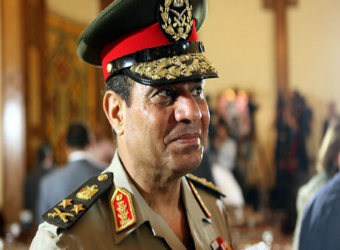The only thing more stunning than the rise to the heights of state power of Egypt’s Muslim Brotherhood is the swiftness of its fall. The newest blow came on Monday, when the Cairo court for urgent matters announced a comprehensive ban on “all activities” by the Brotherhood, while the majority of the organisation’s leadership remain in police custody and its assets are frozen.
The military’s ousting of President Mohamed Morsi on July 3, and its continuous assault on the group ever since, are open to conflicting interpretations. From the Brotherhood’s viewpoint they signal the resurrection of the military dictatorship that Egyptians sought to overthrow during the January 25 uprising. Yet this narrative, which paints the Brotherhood as a champion of democracy and an innocent victim of state aggression, fails to acknowledge the ways the group contributed to its own demise. It says nothing about the millions of people who signed petitions and took to the streets to demand Morsi’s resignation in June. And fails to mention that by voluntarily stepping down Morsi could have resolved the crisis without violence, but chose instead to remain defiant.
Yet the narrative advanced by the military and other representatives of the state establishment is even more flawed. Since Morsi’s ousting, Brotherhood members have been denounced as terrorists who threaten Egypt’s national security, a characterisation used to justify the killing and maiming of unarmed men, women and children at protest sites around the country. Contrary to its portrayal in state propaganda, the Brotherhood is not a monolith but an umbrella organisation encompassing a wide range of opinion. Morsi and his close associates are more conservative than other figures in the movement, but even they don’t call for the immediate application of a strict version of Islamic rule.
The Brotherhood’s achilles heel was not its embrace of ideological extremism but a reluctance to accept other social and political forces as equals, and to initiate confidence-building measures needed to earn their goodwill and trust. The Brotherhood emerged from 60 years of authoritarian rule with its organisation relatively intact, yet the group’s top leaders remained encapsulated within the movement’s insular networks, convinced that they were uniquely qualified to manage society’s affairs. Such characteristics left the group ill-prepared to govern a highly fractious society – particularly one with officials of the deep state having in effect a veto, and an economy teetering on the brink of collapse.
The primary responsibility for the disruption of Egypt’s democratic transition, and the paroxysms of violence that have ensued in its wake, however, lies with General al-Sisi and the Egyptian army. Over the summer, hundreds of unarmed civilians – most of them Brotherhood supporters – who were unwilling to leave protest sites have been gunned down. Under these circumstances, it is understandable if the rage and sorrow of its members undermine their capacity for serious introspection.
For healing to occur, all of Egypt’s civilian political actors must insist that the military return to barracks, and must devise a framework for the Brotherhood’s constructive reintegration into the political process. Any attempts to restore democracy are prone to disruption if they are not underpinned by a deeper process of national reconciliation.
The ageing leadership of the Brotherhood will not be daunted by repression. They survived many – in some cases, more than 20 – years in Nasser’s prisons, and personal sacrifice for the cause has come to function as their main currency. Plus they adopt a long time horizon and believe that God is on their side. And they can now take on the mantle of defending democracy as well as that of Islam. Indeed, the Brotherhood’s top leaders are unlikely to give up on democracy because it is on its foundations – as much as on those of religion — that its claim to rightful authority has come to rest.
The central issue is what, if any, lessons the Brotherhood learns from its devastating setback. Some younger members have begun to circulate petitions demanding that the senior leaders resign, arguing that their hubris and misjudgment set the Brotherhood on a collision course with other groups in society and that, by remaining defiant in the face of overwhelming opposition, they put its members in harm’s way.
It is unlikely that the old guard will acknowledge its mistakes and initiate a major course correction, particularly when so many of them are in jail or on the run. But within the group, calls for a shake-up in the group’s top leadership are likely to accelerate. It remains to be seen if loyalty to the Brotherhood’s old leaders and old way of doing things, or an understanding of the urgent need for change, prevails. In the meantime, Egypt’s new military-backed leaders should be mindful of the fact that demonising the Brotherhood and banning the group are likely to hamper the cause of those calling for its reform and so undermine the prospects for the healthy re-integration of mainstream Islamists into Egypt’s political system.
Source: The Guardian


